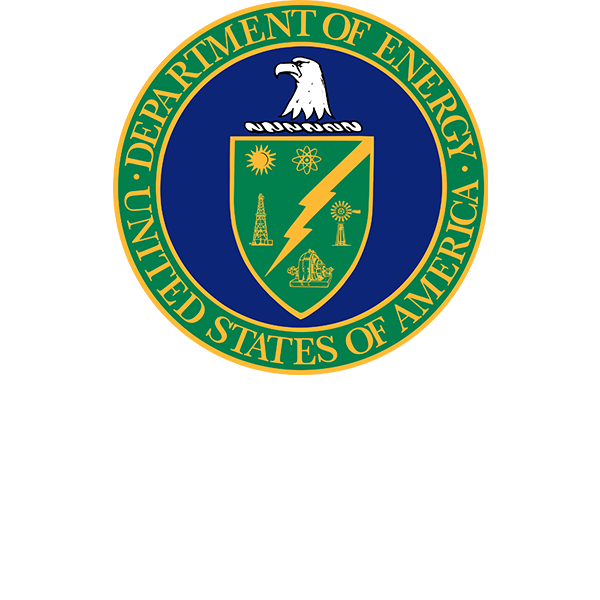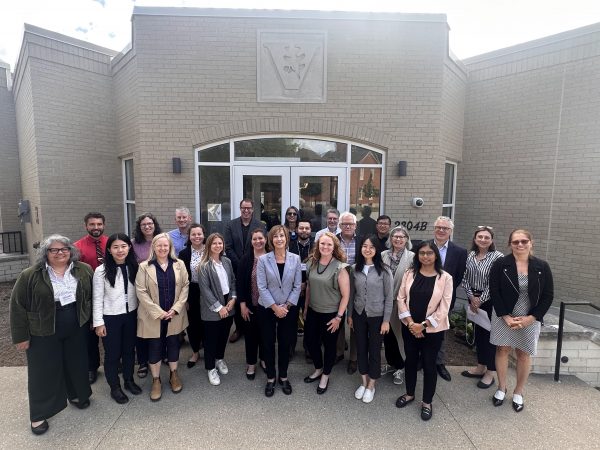

-
$7.07M
DOE Funding at Vanderbilt
FY 2023
Partnering with Oak Ridge National Laboratory
Vanderbilt is one of the UT-Battelle Core University Partners working with Oak Ridge National Laboratory to jointly appoint faculty with common scientific interests, support collaborative research, train graduate students, and provide regional support for ORNL in the state of Tennessee. Padma Raghavan, vice provost for research and innovation, serves as Vanderbilt’s representative on the UT-Battelle Board of Governors, which oversees the management of ORNL and works closely with ORNL leadership to promote collaborations. Jason Valentine is the core university liaison with ORNL. Vanderbilt and ORNL are committed to their ongoing research partnership.
Vanderbilt researchers at ORNL are using various technologies for research in engineering, chemistry, physics, biochemistry and cell biology, including the Spallation Neutron Source, the Center for Nanophase Materials Science, and the Titan and Summit supercomputers. Collaborative research teams are:
- Launching TNGO, the Transportation Network Growth Opportunity, an initiative supported by the Tennessee Department of Economic and Community Development to make the state the premier destination for mobility R&D investment in the Southeast; TNGO aims to connect, compute, power and fuel the future.
- Finalizing plans for diverse, regional innovation and talent development hubs for automotive, aerospace, energy, food and beverage, and other materials via two NSF Regional Innovation Engines awards.
- Using scanning-tunneling microscopy to understand subatomic-thin membranes and enable the hydrogen economy.
- Demonstrating new methods to induce currents in 2D materials to lead to innovations in the next generation of electronics and energy storage.
- Advancing our understanding of crystal structures to further improve next-generation semiconductors.
- Understanding how optical metasurfaces can be used to significantly increase computational speed while also reducing power consumption.
- Simulating the creation of high-energy burst of light via sound waves for the development of therapeutics and energy materials.
- Developing joint projects to address climate change and environmental justice challenges.
Vanderbilt University initiated a workshop and seminar exchange program with ORNL to enhance collaborations and drive innovation in areas of national significance, such as nanoscience.
DOE renews partnership with Vanderbilt collaboration: Institute for Advanced Composites Manufacturing Innovation
The Department of Energy has renewed its partnership with the Institute for Advanced Composites Manufacturing Innovation. The IACMI is a community of industry, universities, national laboratories and government agencies working together to accelerate the development and adoption of innovative manufacturing technologies. The funding connected with the renewed partnership will be used over five years to further technological R&D and accelerate commercialization in the domestic composites manufacturing sector. Vanderbilt’s Laboratory for Systems Integrity and Reliability is funded by an investment from IACMI. As a part of IACMI, Vanderbilt faculty and students are part of advancing composites manufacturing technology, which has a significant positive impact on people’s lives and the economy. Every IACMI project is highly collaborative, featuring industry partners from across the composites manufacturing supply chain. Vanderbilt’s contributions to IACMI are in the general area of manufacturing quality control.
DOE supports Vanderbilt students
An all-women team from Vanderbilt won a U.S. Department of Energy competition that offers the winner an internship at a DOE national laboratory. The student team created a composite beam machine that produces steel-timber beams, providing strong support for buildings. The solution reduces demand for recycled steel, creates jobs and improves air quality.
A graduate student in interdisciplinary materials science was selected by the Department of Energy for an extended residency at the Savannah River National Laboratory. Her Ph.D. project focuses on transport of subatomic species through atomically thin 2D materials for isotope separations, energy storage and conversion. The award will include a monthly stipend and travel support to and from the laboratory in Jackson, South Carolina, which specializes in various technologies.
CRESP provides innovation, award-winning students and an independent voice for DOE environmental management
The Consortium for Risk Evaluation with Stakeholder Participation made substantial contributions to DOE Office of Environmental Management’s major challenges during 2023, including understanding performance of vitrified and grouted low activity waste during long-term near-surface disposal, groundwater remediation strategy, improving performance of landfill disposal systems, and risk communication for multiple site-specific issues. CRESP also was a major participant in specific requests from Congress: evaluation of alternatives for supplemental treatment of low activity waste at Hanford, and co-leading with Savannah River National Laboratory the life cycle evaluation of fluoropolymers in multiple commerce sectors.
CRESP educational programs support approximately 20 graduate students and postdoctoral researchers and provides ongoing early career development activities for a broader group to encourage understanding of career opportunities in the nuclear-environmental sector.
CRESP is one of the nation’s leading independent, interdisciplinary research groups focused on waste management and environmental legacy from the production of defense nuclear materials and nuclear energy. Vanderbilt leads this multi-university consortium of engineers, scientists, and legal and policy experts who have contributed over the past 25 years to the progress being made in addressing the nation’s largest environmental liability. With the support of DOE, these nuclear waste experts leverage their knowledge to help the U.S. find safe ways to effectively manage nuclear waste from both defense nuclear materials production and civilian nuclear power sources. Academic research through CRESP educates undergraduate and graduate students and postdoctoral scholars while carrying out foundational research needed to improve the efficiency and effectiveness of the cleanup program.
Creating a sustainable, cost-effective method to desalinate industrial wastewater
Vanderbilt researchers are part of a team that has developed a cutting-edge method that seeks to make the removal of salt from hypersaline industrial wastewater far more energy-efficient and cost-effective. While desalination through reverse osmosis has made tremendous strides—allowing for salt removal from seawater for less than a penny per gallon—it still falls short in eliminating saline in wastewater from industries like mining, oil and gas, and power generation and in inland brackish water. A professor of civil and environmental engineering and his team believe they have an answer to this dilemma. The new treatment technology called electrodialytic crystallization has the potential to reduce the energy consumption and cost of brine crystallization. This study is funded by the National Alliance for Water Innovation, a public-private partnership led by DOE’s Lawrence Berkeley National Laboratory.
DOE SBIR/STTR funding at Vanderbilt
SkyNano LLC, a science-based technology company focused on commercializing a free-market solution to carbon pollution, was started by a graduate student and a professor at Vanderbilt and is a recipient of funding from the highly competitive Small Business Innovation Research/Small Business Technology Transfer grant from DOE.
The SBIR/STTR program encourages small businesses to participate in federal research and development with the potential for commercialization. This program plays a vital role in the innovation ecosystem at Vanderbilt by supporting startups in the early stages of research and development.
The Wond’ry, Vanderbilt’s Innovation Center, and the Center for Technology Transfer and Commercialization at Vanderbilt University contributed to the startups’ growth in various capacities, from assisting with ideation and R&D to facilitating invention disclosures and commercialization services. Founders of these startups span Vanderbilt faculty, alumni, staff and students.
According to Launch Tennessee, companies awarded their SBIR/STTR matching funds have created more than 939 direct jobs and had an economic impact of $146,125,214 in Tennessee—a return of $11.24 for every public dollar invested into the program.
For more information, please contact the Vanderbilt Office of Federal Relations:
Christina West 202-216-4370 | Heather Bloemhard 202-216-4368
federalrelations@vanderbilt.edu
FY 2023